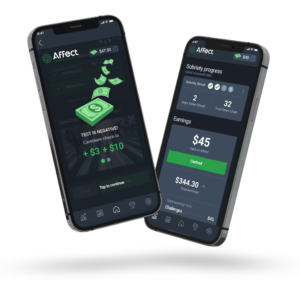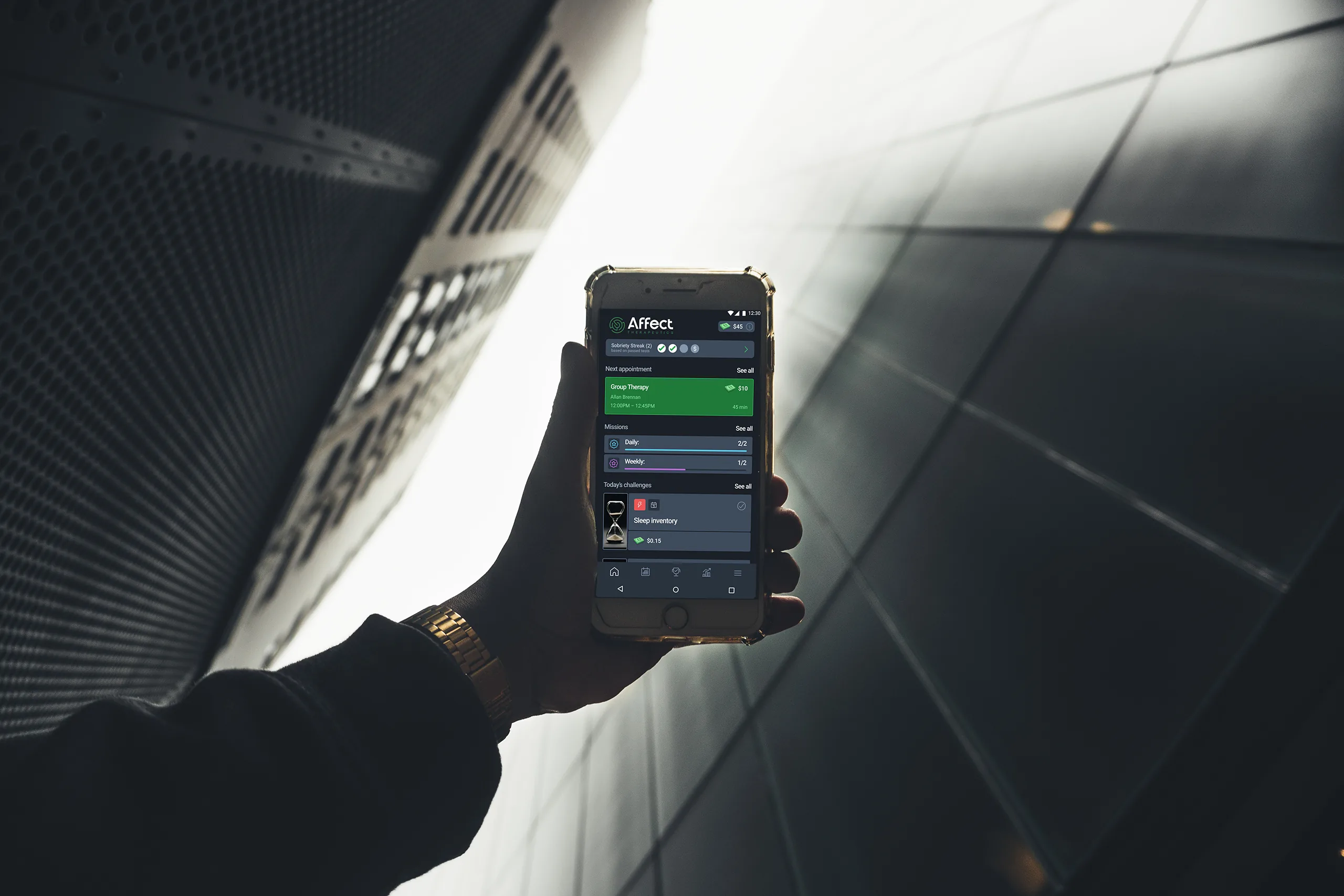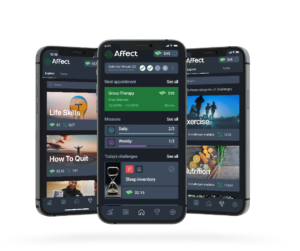
How to Stop Using Oxycodone and Opioid Painkillers
With medical support, therapy, and the motivation of science and technology, you can reclaim your life from addiction to pain medications
Prescription opioid medications such as OxyContin, Vicodin, Percocet and other pain killers are highly addictive and dangerous substances. The danger is now even more extreme as an increasing number of these pills are counterfeit and contain fentanyl – a powerful and deadly synthetic opioid that can quickly kill someone with just a small dose. Breaking free from addiction to prescription painkillers is an urgent matter of life and death.
Affect’s digital outpatient treatment program works to beat opioid addictions. You can get the medications, care and support you need to quit using opioids without going to an outpatient, inpatient or residential rehab facility. Affect brings all the services of an outpatient clinic right to you, including medications like suboxone, group and individual therapy, and more. Affect’s app is built with neuroscience and technology to stimulate your brain and motivate your recovery journey.
Affect’s app and telehealth outpatient program ranks in the top 1% of all addiction treatment providers and is proven to be more than twice as effective as traditional methods, allowing our members to quit using opioids and start building healthy, happy lives as they form new habits.

With medications to ease discomfort and manage withdrawal, Affect can help you beat addiction without going to rehab
Why are Opioid Medications Addictive?
Addiction often begins innocuously: individuals are prescribed opioids for legitimate pain management following surgery, injury, or chronic conditions. These medications are highly effective at alleviating pain, but they also produce feelings of euphoria, which can lead to misuse.
Over time, as tolerance builds, individuals may require higher doses to achieve the same effects, increasing the risk of dependency and addiction. The transition from legitimate use to abuse can be swift and subtle, leading many down a path of addiction without them realizing the danger until it’s too late. The addictive nature of these drugs, coupled with their widespread availability, has fueled a growing epidemic of opioid addiction and overdose deaths.
How to Break Addiction to Opioid Painkillers
Breaking an addiction to opioid painkillers is a challenging but achievable process that typically requires a comprehensive approach involving medical, psychological, and social support.
The first step often involves medically supervised detoxification, where healthcare providers manage withdrawal symptoms and ensure safety. Medications such as buprenorphine, methadone, and naltrexone can be used to reduce cravings and ease withdrawal.
Following detox, long-term treatment plans should include behavioral therapies like cognitive-behavioral therapy (CBT) and counseling to address the psychological aspects of addiction.
Support groups and recovery programd provide ongoing encouragement and community. It’s also crucial to address any underlying issues, such as chronic pain or mental health disorders, that may have contributed to the addiction.
Comprehensive treatment plans, personalized to the individual’s needs, increase the likelihood of sustained recovery and help individuals rebuild their lives free from the grip of opioid addiction.

Affect’s app uses gamification and rewards to stimulate the brain, proven by neuroscience to help break difficult addictions
Does Contingency Management work for Opioid Painkiller addiction
Contingency management (CM) is a highly effective behavioral therapy in the treatment of prescription painkiller addiction, leveraging positive reinforcement to encourage sobriety and adherence to treatment.

This approach involves providing tangible rewards, such as vouchers, prizes, or other incentives, to patients who meet specific treatment goals, such as passing drug tests or attending therapy sessions.
Research has shown that CM significantly increases retention in treatment programs and reduces drug use compared to standard care alone. The immediate and concrete nature of the rewards helps to combat the often delayed gratification associated with recovery, making it a powerful motivator for individuals struggling with addiction.
By reinforcing positive behaviors and providing structure, contingency management can enhance overall treatment outcomes and support long-term recovery from prescription painkiller addiction.
Is Opioid Addiction Dangerous?
Opioids are powerful and highly addictive drugs that can have serious health consequences for people who use them, and they are deadly. Opioid addiction is a crisis in the United States where more than 2.7 million people have an opioid use disorder (OUD), including 2.3 million people whose disorder is with prescription opioids like pain killers. Of the more than 106,000 overdose deaths in 2021, more than 80,000 of them involved opioids.
There are more health consequences than overdoses. The opioid addiction crisis has led to a rising number of infants being born with opioid dependency because their mothers used substances during pregnancy. There is also an increase in the spread of infectious diseases like HIV and hepatitis C (HCV).
Opioids seriously damage the brain. Studies have shown that people with opioid dependency have impaired areas of the brain for memory, attention, spatial planning, and executive functions. Information processing speed is lowered, causing great difficulty in learning and adjusting to new situations, problem solving, reasoning and decision making.
Opioids damage the heart, the kidneys, the liver, and do long term damage to many systems in the human body.
The emergence of fentanyl, a powerful synthetic opioid that is strong enough to kill a person in minutes with just a small dose, has made opioid addiction even more deadly. An increasing number of pills that look like prescription painkillers are actually fentanyl pressed into the shapes and colors of medications like oxcycodone, vicodin, and others.
Can You Quit Opioid Painkillers with Telemedicine Addiction Treatment?
Yes, telemedicine addiction treatment such as Affect’s program is a highly effective option and has become increasingly accessible and highly effective. It’s possible to quit using opioids without going to a rehab clinic. Telemedicine brings care right to you and makes it easier to stay on your recovery journey.
Telemedicine provides patients with convenient access to medical professionals who can prescribe medications like buprenorphine and naltrexone, monitor progress, and offer behavioral therapies through virtual sessions.
This method is particularly beneficial for individuals in remote areas or those who have mobility or transportation issues. Telemedicine also allows for more frequent and flexible contact with healthcare providers, fostering continuous support and reducing the stigma associated with seeking addiction treatment.
By leveraging digital platforms, patients can receive comprehensive care that includes medical supervision, counseling, and peer support, all crucial components for successfully overcoming opioid addiction.

What’s the Best Way to Quit Using Opioids?
Affect’s program works to beat opioid addictions
Affect was designed to make treatment accessible to anyone, anywhere, without going to rehab. Our program is entirely digital and delivered through a smartphone app, which means you can do it from home or work, in the city or in the country. We accept both employer and Medicaid insurance, so you don’t have to worry about high healthcare costs. It’s convenient and cost-effective, but it’s also complete, ensuring you get care that is supported by science and is customized for your needs.
Since drugs rewire the brain’s rewards system, research has proven that the best way to beat difficult addictions is to stimulate the brain’s system in other ways. The most effective method is by winning rewards for doing things that help you quit. This method is known as “contingency management.”

It is very common to relapse while recovering from addiction, and this is one reason why traditional rehab clinics with strict abstinence requirements can fail. Research shows that gradually reducing use over time works better, a method addiction specialists call “harm reduction.”
Affect’s digital program is in the 1% of all treatment providers and data shows our program to be twice as effective as traditional methods to treat opioid addictions and help people quit. Our members praise the program for being able to help them when nothing else has worked.
Our members dramatically increase their number of sober days in just the first month. Their energy and health improves and their brains start to recover. With the help of licensed addiction counselors, members explore the roots of their addiction and learn how to identify and control triggers without feeling the need to use opioids. As withdrawal symptoms fade and healthy habits are formed, our members rebuild their lives as they recover from opioids. You can read what they have to say about our program.
Affect’s program is also unique in supporting “whole recovery” of our members’ lives. Care teams include advocates who provide members with support for housing, employment, healthcare and more.
Are you ready to stop using opioids and get your life back? Reach out and talk to us to find out more, or download the app and try it yourself.
Just tell us a bit about yourself and we’ll get right back to you
Suboxone® is a registered trademark of Indivior PLC. Any reference to it is for informational purposes only, and is not endorsed or sponsored by Indivior PLC.


